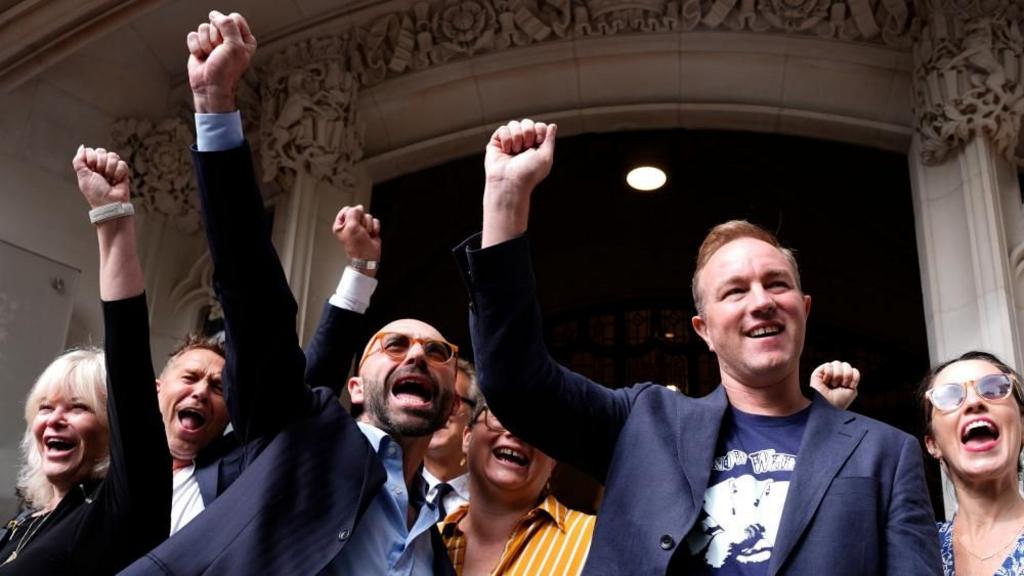In a landmark ruling, the convictions of two former City traders central to a major financial crisis scandal have been overturned after a decade-long legal battle.
Tom Hayes and Carlo Palombo, previously imprisoned for manipulating interest rates used in interbank lending, have had their convictions quashed.
They were among 19 City traders convicted across the US and UK for manipulating Libor and Euribor interest rates, benchmarks impacting borrowing costs on various loans, including mortgages and auto financing.
Following Wednesday’s judgment, Mr. Hayes described the “surreal” experience of being cleared, stating that the conviction had “destroyed” his family.
The Supreme Court’s decision is a victory for the traders, who have maintained for 10 years that they were victims of judicial miscarriages.
Their defense argued that they were wrongly prosecuted for standard commercial practices in an attempt to appease public anger towards banks following the financial crisis.
After a decade spent fighting to clear their names, the Supreme Court determined that the criminal trials of Mr. Hayes and Mr. Palombo were unfair, leading to the overturning of their convictions.
Speaking outside the court, Mr. Hayes stated that the decision was “a long time coming” after his “cruel and pernicious” sentence. He served five and a half years in prison.
“It destroyed my family, [I] missed most of my son’s childhood,” he said, adding that it also led to the end of his marriage.
“For so long I’ve been an international fugitive…and now I can move on with my life, or try to.”
When asked by the BBC’s World at One about seeking compensation, he said he would seek legal advice.
“No amount of money gives you back that time, and actually no amount of money would make me feel better about that time,” he said.
Mr. Palombo described the situation as “a crazy experience.”
“I don’t even know how I feel right now,” he said. “It’s a mixture of relief, happiness.”
The Serious Fraud Office, which originally prosecuted the traders, has stated that it will not seek a retrial.
Mr. Hayes and Mr. Palombo were part of a group of traders and brokers prosecuted for rigging interest rates in nine criminal trials in London and New York between 2015 and 2019.
Mr. Hayes, a former UBS trader, was the first banker jailed over the scandal in 2015.
Originally sentenced to 15 years, he reduced it to 11 years on appeal and was later released in January 2021.
Mr. Palombo received a four-year sentence in 2019 and was also released in 2021.
The Libor scandal emerged in 2012, revealing that banks were artificially inflating rates to boost trading profits and lowering them to conceal financial difficulties following the global financial crisis.
The financial crisis, beginning in 2008 with the collapse of Lehman Brothers, triggered recessions across numerous countries.
The BBC uncovered evidence of a larger, state-led “rigging” of interest rates, influenced by central banks and governments during the financial crisis.
Evidence implicating Downing Street and the Bank of England was suppressed throughout the criminal trials.
In 2022, US courts found no evidence of traders breaking laws or rules, quashing all American convictions, leaving the UK as the only country where the accused actions were criminalized.
In the UK, the traders’ cases were blocked from reaching the Supreme Court by the Court of Appeal five times between 2015 and 2019.
Lord Leggatt, one of the five justices reviewing the case, cited jury direction errors during the trials as making the convictions “unsafe” and unsustainable.
“That misdirection undermined the fairness of the trial,” he added.
However, the court also noted “ample evidence” for a jury to reasonably conclude that Hayes conspired to manipulate Libor rate submissions.
Conservative MP Sir David Davis called for a “shake-up” of the judicial system following Wednesday’s judgement.
“This scapegoating exercise happened as a result of collusion between the banks and government agencies,” he said.
The SFO acknowledged the judgement in a statement, adding that it had “determined it would not be in the public interest for us to seek a retrial.”
Mr. Hayes’ solicitor, Karen Todner, called for a full public inquiry into the convictions and for justice system reforms.
“Tom has missed out on formative years with his son, time with his family, and the loss of his career and his home,” she said. “Time he will never get back”.
She added: “There are no winners here.”
With the Supreme Court exonerating Mr. Hayes and Mr. Palombo, the remaining traders convicted of interest rate “rigging” could also seek to have their convictions overturned.
Elizabeth Robertson, a lawyer for one of the other convicted traders until 2016, suggested the ruling could even cast doubt on the convictions of those who pleaded guilty.
“I think the judgement says enough for those that pleaded guilty to have their convictions quashed as well,” she said.
Get our flagship newsletter with all the headlines you need to start the day. Sign up here.
Mark Johnson, 59, has fought to establish his innocence ever since he was convicted of fraud in 2017.
The UK’s financial watchdog says the bank had failed to properly check two of its clients.
NatWest bank has taken another step towards ending its business in the Republic of Ireland by selling its 12% shareholding in Permanent TSB (PTSB).
Stone, Staffordshire, has not had a branch of a high street bank since the last closed in 2024.
The facility in Cockermouth will enable people to access services from several banks at one site.

